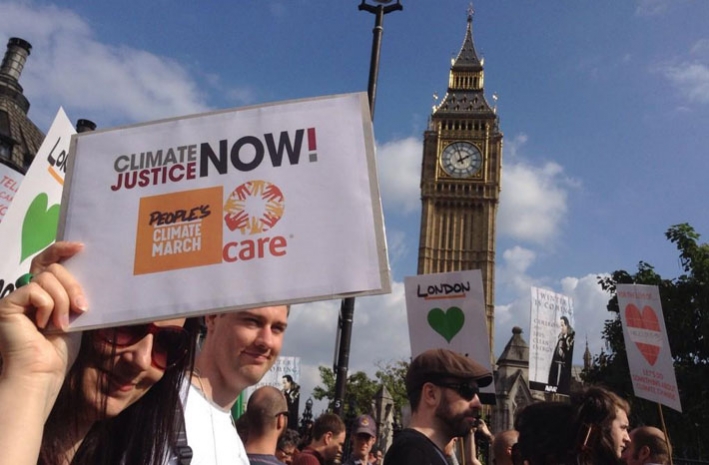Change is happening – it is impossible to ignore that fact – so we have to decide whether to take the choices now that will put us onto a manageable path, or wait until we have to pick up the disastrous pieces. Words I heard over and over again on the climate march yesterday were that business as usual is no longer an option; either we choose to change in order to stop the problem, or we wait and are forced to change in reaction to disaster. We literally have to decide whether we want to be part of the problem or part of the solution.
And the good news is that there are solutions. In fact, there are many, many solutions.
Among these are efforts to build resilience to the impacts of climate change on the ground. CARE is at the forefront of helping vulnerable communities adapt to climate change – such as the five-year Adaptation Learning Programme (ALP) in Kenya, Ghana, Mozambique, and Niger, and the Africa Climate Change Resilience Alliance (ACCRA) which has been working in Ethiopia, Uganda and Mozambique since 2009, supporting governments, civil society and the wider development community to integrate climate change adaptation and resilience into their policy and practice.
We also need solutions for stopping climate change. CARE is not alone in calling for a dramatic reduction in greenhouse gas emissions, backed by commitment from world leaders to a new and ambitious climate change treaty.
But the good news is that it is not all bad news! Alice Hooker-Stroud, a scientist from the Centre for Alternative Technology’s Zero Carbon Britain research project, spoke at yesterday’s rally reminding us that a modern, zero-emissions society is possible using technology available today.
We don’t lack the solutions; we lack the actions necessary from our politicians.
Writing in the Guardian newspaper (21 September 2014), Desmond Tutu reminded us of what enormous societal changes people power has brought about, and that in facing the greatest human rights challenge of our time – climate change – we need to work together again to bring about enormous and long-lasting change for humanity. He wrote:
“The United Nations deserves kudos for its leadership on human rights issues. But on climate change, it has run up against governments and leaders of industry who have until now put short-term economic and political goals ahead of our collective long-term survival. We can no longer tinker about the edges. We can no longer continue feeding our addiction to fossil fuels as if there were no tomorrow. For there will be no tomorrow. As a matter of urgency we must begin a global transition to a new safe energy economy. This requires fundamentally rethinking our economic systems, to put them on a sustainable and more equitable footing...
“Just as we argued in the 1980s that those who conducted business with apartheid South Africa were aiding and abetting an immoral system, we can say that nobody should profit from the rising temperatures, seas and human suffering caused by the burning of fossil fuels.”
There’s no denying that action is needed. Individual people’s actions are not enough on their own, but it’s through individual people’s actions – such as the hundreds of thousands who protested in climate marches across the world yesterday – that we signal to decision-makers what sort of world we want, and what sort of changes are needed.
So the only question that remains is, will people power be stronger than coal power?



